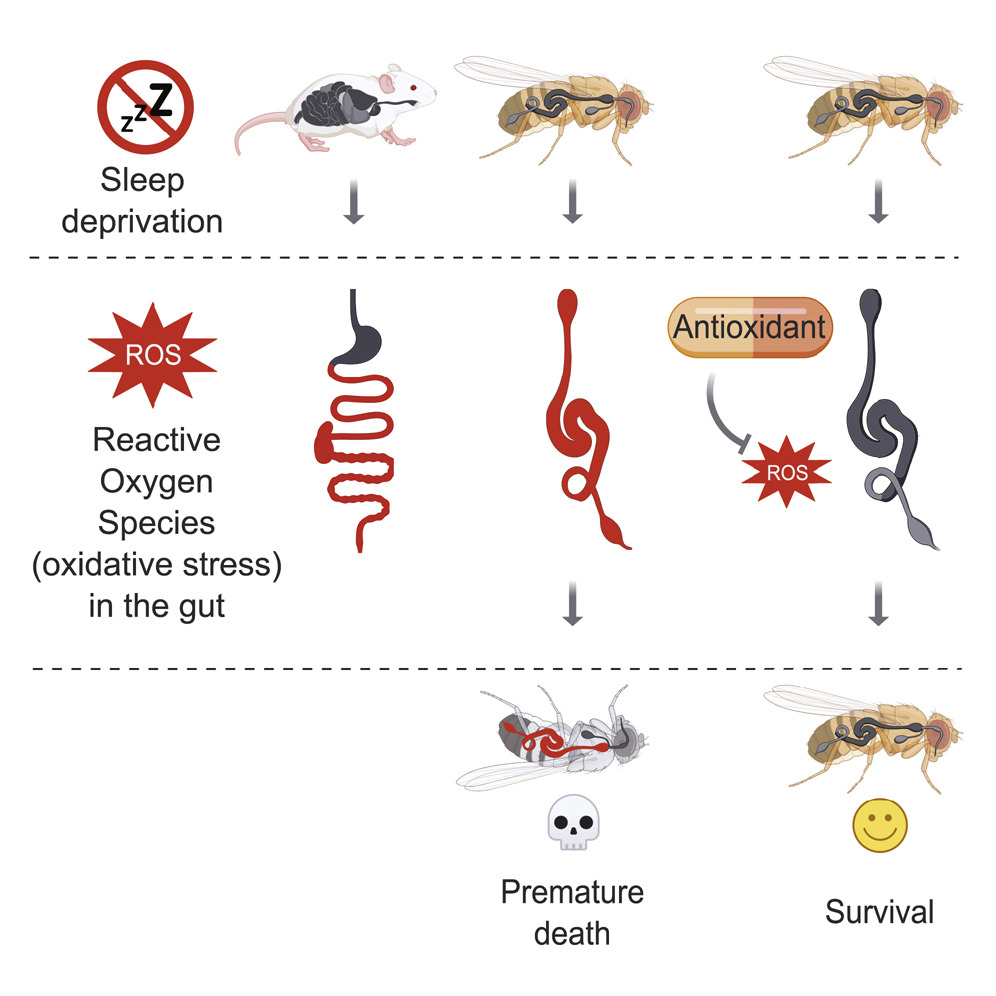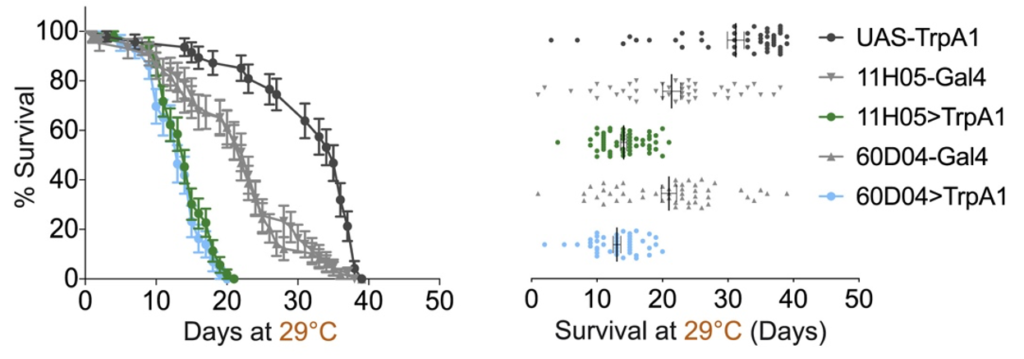Harvard Scientists Find Solution to Avoid Death Caused by Sleep Deprivation
Researchers at Harvard find that antioxidants targeting the gut prevent early death caused by sleep-deprivation in flies.
Highlights:
- In flies, sleep-deprivation shortens lifespan by 50% due to gut reactive oxygen species (ROS) — molecules that damage cells when in excessive amounts.
- Mice that are sleep-deprived also have increased gut ROS.
- Antioxidants like melatonin and NAD+, which help neutralize ROS, largely prevent sleep-deprived flies from dying early.

Over a hundred years of research and we still don’t quite know why we need to sleep. What we do know is that sleep is necessary, as countless animal studies have demonstrated that insufficient sleep can cause early death. However, the reason for this also remains unclear.
Now, scientists from Harvard University report in Cell that sleep loss can cause death through the accumulation of ROS in the gut. Vaccaro and colleagues demonstrate that sleep-deprived flies live significantly shorter lives than their well-rested counterparts. However, several antioxidants, including melatonin and NAD+, largely prevent this decrease in survival. Furthermore, elevated intestinal ROS are also present in sleep-deprived mice.
Gut Reactive Oxygen Species Reduce Lifespan by 50%
To study how severe sleep loss impacts survival, Vaccaro and colleagues examined fruit flies (Drosophila) genetically modified to stay awake at warm temperatures (29°C) via heat-activated proteins in the brain. The researchers found that sleep-deprived (SD) flies (about 10 days without sleep) lived about half the lifespan of flies allowed to sleep.

To determine how SD flies may succumb to an early death, Vaccaro and colleagues examined various markers of cell damage throughout the body. They found that most tissues appeared normal, except for the intestines, which had increased levels of ROS. ROS are highly reactive, unstable molecules that cause damage to cellular components like DNA when at high levels, a phenomenon known as oxidative stress.
To test the generalizability of their findings, Vaccaro and colleagues examined the effect of SD on the lifespan of mice. To keep the mice awake for five days, they were placed into a restriction chamber where a rod on the floor constantly rotated to agitate them. Upon examining multiple internal organs, it was found that SD mice had elevated ROS levels, specifically in the small and large intestines, similar to the flies. Markers of DNA damage and cell death were also observed, indicating damage done by ROS.
Antioxidants Prevent Premature Death
The Harvard researchers asked whether clearing ROS could extend lifespan. They tested 53 compounds known to have antioxidant — ROS neutralizing — properties and found that 11 allowed for a normal or near-normal fly lifespan. These compounds included melatonin, lipoic acid, and NAD+. Upon examination of multiple internal organs, these antioxidants were shown to decrease ROS, specifically in the intestines.

Antioxidants to Slow Human Aging
The findings of Vaccaro and colleagues suggest that excessive intestinal ROS could reduce our lifespan if we don’t get enough sleep. This brings up the importance of antioxidants, which can reduce ROS. While ROS are needed for normal biological processes, when they accumulate to excessive levels, they cause oxidative stress. Some scientists believe that oxidative stress is the primary cause of aging, while most others accept that it is a hallmark — or underlying cause — of aging. While the results of Vaccaro and colleagues suggest that oxidative stress worsens with sleep deprivation, this aging hallmark also increases with normal aging in multiple organs.
Antioxidants can be found in abundance in various fruits and vegetables but can also be taken in supplement form. However, studies showing the anti-aging effects of antioxidants on humans are limited or require large doses. Lipoic acid is an antioxidant found in foods like red meat and spinach and can be purchased in supplement form. Melatonin, a hormone that the brain produces naturally for sleep and less commonly known for its antioxidant properties, is also readily available as a supplement. NAD+ is not an antioxidant per se but an important mediator of cellular energy that limits oxidative stress by various pathways. NAD+ can usually be supplemented by consuming its precursors, like NMN. Between lipoic acid, melatonin, and NAD+, NAD+ may be the best option for potentially slowing aging as it is backed by the most scientific evidence.

